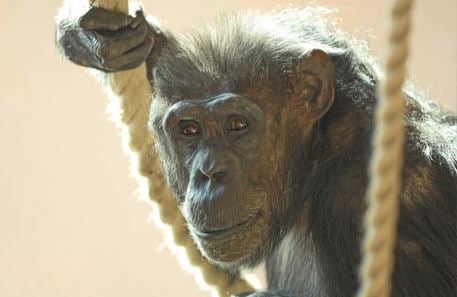A study claiming that Dutch chimpanzees pick up the Scottish accent after being moved to a new colony in Scotland was flawed, says a team of experts from the UK, Germany and the United states.
Co-author of the new analysis, Dr. Brandon Wheeler, a Biological Anthropology lecturer at the University of Kent’s School of Anthropology and Conservation, and colleagues concluded the research was flawed in several fundamental ways.
Alongside researchers from the German Primate Center in Göttingen and the University of New York, he said this was because:
– they misread the causes behind changes in vocalization,
 Paul (left), from the Dutch group. (Photo credit: Emma K Wallace). Emma, from the Scottish group. (Photo credit: Jamie Norris)
Paul (left), from the Dutch group. (Photo credit: Emma K Wallace). Emma, from the Scottish group. (Photo credit: Jamie Norris)
– they did not take into account the fact that most initial vocalizations of the two groups were quite similar to begin with,
– the vocalizations did not change significantly over the studied period.
The research in question, published in February’s issue of Current Biology, centered on the study of two sets of chimps in Edinburgh Zoo.
One group had recently arrived from the Netherlands, while the other had been captive for several years.
Over a period of three years, the investigators had claimed that the recently-arrived chimps had altered their sounds to the ones that had been captive for several years when communicating about apples.
The researchers had concluded that the new chimps began to adopt a ‘Scottish accent’.
 Chimpanzees (Pan troglodytes) exist in the wild in the rainforests of West and Central Africa, in communities of up to and over 100 individuals. Within these communities they will break off into smaller groups throughout the day to travel and feed. (Image: Edinburgh Zoo)
Chimpanzees (Pan troglodytes) exist in the wild in the rainforests of West and Central Africa, in communities of up to and over 100 individuals. Within these communities they will break off into smaller groups throughout the day to travel and feed. (Image: Edinburgh Zoo)
The authors of the original study suggested that their findings provided the first evidence ‘for vocal learning in a referential call in non-humans.’
They said their evidence demonstrated that chimps could learn different calls for the same object, which was seen as a major finding in the study of language evolution. The study gained the attention of linguists, biological anthropologists, other experts and lay people globally.
Original conclusions ‘misplaced’
However, this latest review, also published in Current Biology, suggests that the original conclusions were misplaced.
Dr. Wheeler, Dr. Julia Fischer, from the German Primate Center, and Prof. James P. Higham, from New York University, found after closer inspection of the data that the range of calls both groups of chimps were originally giving in response to apples largely overlapped.
Just a few calls of the Dutch chimps were outside the range of calls given by the Scottish chimps.
They found there was some statistically significant change in the calls over time after the Dutch chimpanzees moved to Scotland, but the data was ‘biologically weak’.
Such modulation, they added, is a well-known occurrence in animal vocalizations that is found in the majority of primate calls – and even in the calls of goats.
In a Summary in the journal, the authors wrote:
“For one, we are not convinced that the authors controlled for arousal (or at least they did not report such data); furthermore, the vocal characteristics of the two groups largely overlapped already at the beginning of the study. Accordingly, we also question the authors’ claim that their finding ‘sheds new light on the evolutionary history of human referential words’.”
Citation: “Is there any evidence for vocal learning in chimpanzee food calls?“ Julia Fischer, Brandon C. Wheeler & James P. Higham. Current Biology. Volume 25, Issue 21, pR1028–R1029. 2 November, 2015. DOI: http://dx.doi.org/10.1016/j.cub.2015.09.010.
Video – Chimps with a Scottish accent
This video refers to the study that was published in February, 2015 (the original study).
